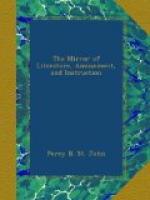He talked of Mr. ——, who was then our Minister at Genoa. “H——,” said he, “is a thorough good-natured and hospitable man, keeps an excellent table, and is as fond of good things as I am, but has not my forbearance. I received, some time ago, a Pate de Perigord, and finding it excellent, I determined on sharing it with H——; but here my natural selfishness suggested that it would be wiser for me, who had so few dainties, to keep this for myself, than to give it to H——, who had so many. After half an hour’s debate between selfishness and generosity, which do you think” (turning to me) “carried the point?”—I answered, “Generosity, of course.”—“No, by Jove!” said he, “no such thing; selfishness in this case, as in most others, triumphed; I sent the pate to my friend H——, because I felt another dinner off it would play the deuce with me; and so you see, after all, he owed the pate more to selfishness than generosity.” Seeing us smile at this, he said:—“When you know me better, you will find that I am the most selfish person in the world; I have, however, the merit, if it be one, of not only being perfectly conscious of my faults, but of never denying them; and this surely is something, in this age of cant and hypocrisy.”
In all his conversations relative to Lady Byron, and they are frequent, he declares that he is totally unconscious of the cause of her leaving him, but suspects that the illnatured interposition of Mrs. Charlemont led to it. It is a strange business! He declares that he left no means untried to effect a reconciliation, and always adds with bitterness, “A day will arrive when I shall be avenged. I feel that I shall not live long, and when the grave has closed over me, what must she feel?” All who wish well to Lady Byron must desire that she should not survive her husband, for the all-atoning grave that gives oblivion to the errors of the dead, clothes those of the living in such sombre colours to their own too-late awakened feelings, as to render them wretched for life, and more than avenges the real, or imagined wrongs of those we have lost for ever.




